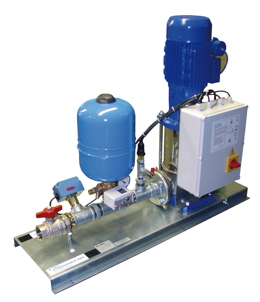Smart fire prevention

Whether accidental or intentional, fires damage more than just the structure of a building. They can wipe out millions of pounds worth of stock, destroy homes and the treasured possessions within them, damage hardearned reputations, pollute the surrounding environment and, in the most serious of cases, cost lives.
The costs to local businesses can also be devastating. From April 2017 to May 2018, over 250 fire-related incidents in commercial or industrial buildings were recorded by the West Midlands Fire Service. Reasons for these fires were varied, but around 110 were due to “system faults”, particularly those relating to wiring or electrical supply.
Perhaps more alarmingly, more than 200 of these incidents were discovered by a person, rather than an automatic fire detector. The data also show that 97 of the buildings involved had no fire alarm system installed, while 13 had an alarm system that was not functional.
 |
|
Innovations in the sprinkler market: The Lowara Hydroquench offers reliability and easy maintenance |
Fire prevention
Fire can spread very quickly, particularly when it has the perfect combination of fuel, oxygen and heat. Having said that, it is actually the smoke caused by a fire that can kill, and this can pose a threat even before the fire has started to spread. It is therefore imperative that countermeasures are taken before the fire can harm people or property.
With the right measures in place, a fire can be contained quickly, thus stopping it from reaching the temperature and gas emission levels at which it becomes lethal to humans. The “right measure”, in this case, is a sprinkler system.
According to the National Fire Chiefs Council (NFCC), sprinklers are the most effective way to ensure that fires are suppressed or even extinguished before the fire service can arrive. Using a specialised suction and discharge pumping system, sprinklers harness water to deliver a concentrated burst of water in order to prevent flames from
A report conducted by the NFCC and the National Fire Sprinkler Network found that, over a twelve-month period, sprinkler systems responded effectively in 94% of incidents and that, when activated, successfully extinguished or contained the fire in 99% of cases. The research also revealed that sprinkler systems were 100% effective in controlling fires in both converted and purpose-built flats.
With such an impressive track record, surely every flat, school and warehouse will be lining up to commission and install a sprinkler system?
Minimal use
Figures released by BBC Breakfast under the Freedom of Information Act have stated that only 2% of UK social housing blocks have a full sprinkler system, while a separate report by the National Fire Chiefs Council revealed that just five per cent of schools in England had sprinklers fitted.
According to Julian Parsons, an executive member of the National Fire Sprinkler Network, uptake is slowly increasing: “Tragedies like the Grenfell disaster have raised public awareness of sprinkler systems, leading to several demonstrations and protests from tenants demanding their installation in recent months.
Landlords are also starting to see the benefits of installing sprinklers: this is particularly true of local authorities who are responsible for high-rise residential blocks.
“Nevertheless, general adoption still remains lower than we would like.”
 |
|
Sprinkler systems - a reliable safety feature that should be more widely used CREDIT: JUNESAMA/ SHUTTERSTOCK.COM |
The reason for these small percentages boils down to a lack of legislation on the use of sprinklers in England. In its current form, the law only requires residential properties of more than 30m in height and warehouses of more than 20,000sqm to be fitted with sprinkler systems, although loopholes do exist.
In Scotland, sprinklers are also a legal requirement for residential buildings, including care homes, sheltered housing, school accommodation and high rises of more than 18m – something the National Fire Sprinkler Network is eager to imitate.
The right protection
“At the NFSN, we are continually lobbying the government to legislate in England in the same way as Scotland and Wales,” Parsons says. “Progress has been made, but more needs to be done to make everyone aware that sprinklers are the right way to protect people, property and the environment.”
There are currently few data to help us understand why general sprinkler uptake remains low, but a few lingering myths and persistent misconceptions about sprinklers, and how they work, may not be helping.







